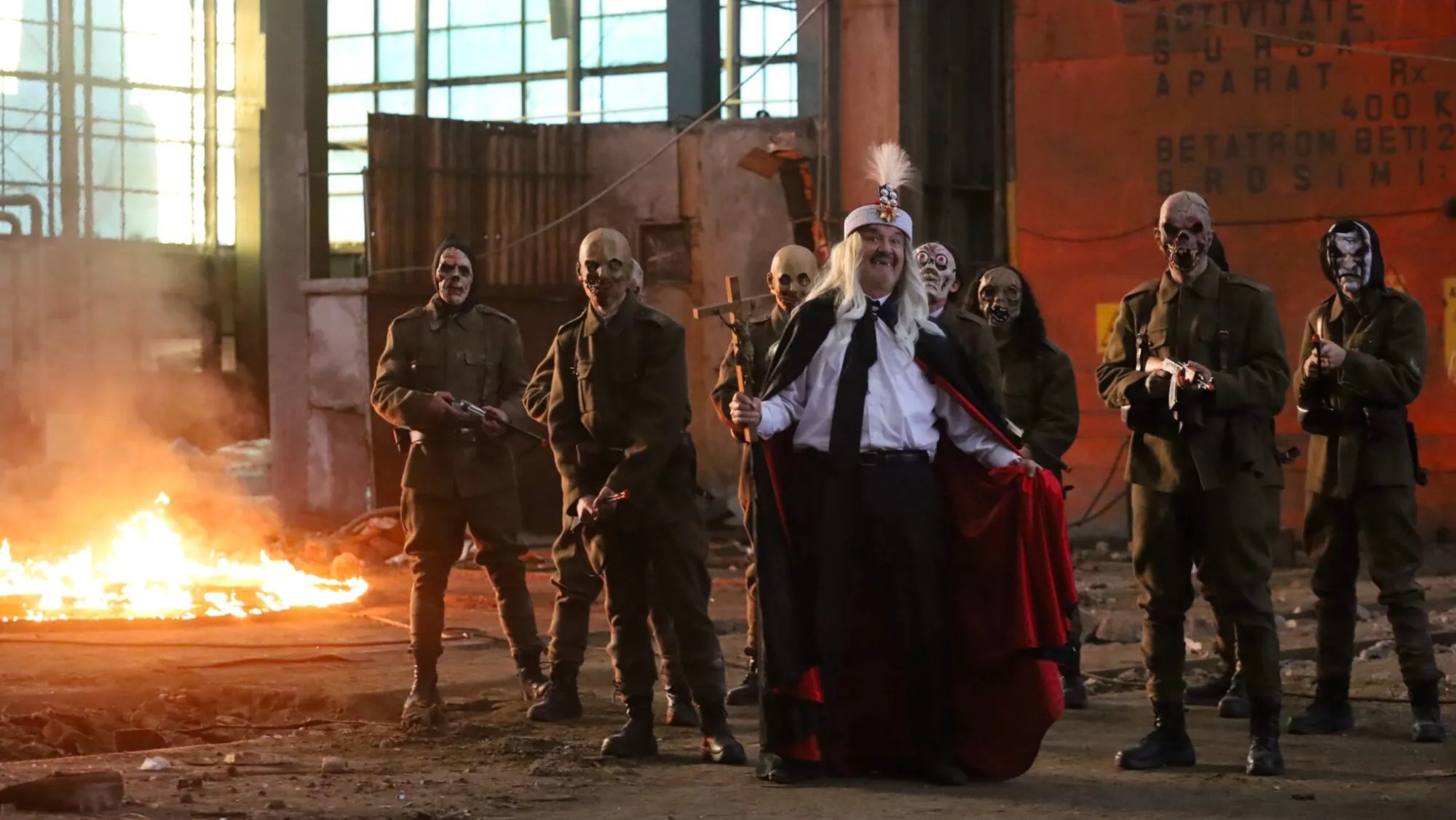![]()
The Phoenician Scheme, the latest work of writer-director Wes Anderson, is another in a long line of films about a very specific time, place and type of person and set of behaviors. In his last two films, The French Dispatch and Asteroid City, Anderson, ever a stylist, has given himself fully to his obsession with quirky, heightened people, places and things. Centered on a ruthless industrialist, played with deadpan calm by Benicio del Toro, the film presents the viewer with a plot about this character, Zsa-zsa Korda, looking to put the finishing touches on what he says are three decades worth of work, the “scheme” of the title. This he does while trying to avoid yet another assassination attempt, reconcile with his daughter-a novitiate nun-and break in a new personal tutor/assistant, Bjorn (Michael Cera).

Courtesy Focus Features
Perhaps the term reconcile is too kind for what Korda is truly trying to achieve, and perhaps it is also part of the problem with the film. This is a work that seems unsure of where to go, and which relies on flimsy connections, fast talking and visual flourishes to paper over what is essentially a basic story about avarice. What little exists in the film to suggest something smarter, greater and more sophisticated, comes very late, by which point the audience may be disinclined to give the film credit for what it is trying to earn.
It is indeed trying to earn it, rather than truly earn it, because while the characters are largely unlikable, you also feel like you know everything about them immediately and are then forced to spend nearly two hours with shallow cretins who attract little interest. The film, as with every Anderson film, is impeccably designed. It is indeed, almost overdesigned. The accusation of his work being “twee” is something this reviewer has never given much credence to, until Asteroid City, and, now, unfortunately, this film. Neither film is bad, but both films suffer from a reach and grasp not matching.

Courtesy Focus Features
While Michael Cera will get most of the attention, although del Toro often carries the film, it is Mia Threapleton, as Liesl, the daughter, who turns in the most nuanced and consistent performance in the film. It is her and her alone that one feels truly has something at stake. This was also a problem in Asteroid City, where the characters inertness might have been the point, but the effect is a lack of sustained interest, and eye rolls with shrugs when something, finally, happens at the very end.
If Anderson is repeating himself, falling into ruts, he is also more visually daring than he ever has been. Yet he is beginning to wear thin, much like a majority of Woody Allen’s work over the past thirty years. In a similar manner, you can predict almost to perfection, what is going to happen, when and how. For a director who once won audiences with warmth, with and surprise, this is a disappointing development.

Courtesy Focus Features
Had the film been more focused, perhaps we could have cared more about what was going on, and who it was happening to. The extended sequences that take place in, shall we say, another place, hint at deeper themes, but these are not reflected or expanded upon in meaningful ways. Yet, taken by themselves, they are delightful. Had the film spent more time connecting them with other events in the film, the film may have a more satisfying conclusion, and it already has a far more satisfying one than what you would expect, given the preceding material. Even so, the film shows signs here of what has plagued Anderson for three films now, and that is forgetting character and story in favor of quirk. While disappointing, the film is worth seeing for die-hard Anderson fans, and a reminder that while he may be going through some sort of phase, the visual talent is still there.
The Phoenician Scheme is now playing in theaters.








I adored Asteroid City, which was equally divisive, I’ll be seeing this one despite the reviews.
With Wes Anderson it’s so often hit or miss.
[b] Portable balancer & Vibration analyzer Balanset-1A [/b]
[b] Description: [/b]
[url=https://allegro.pl/oferta/przenosny-wywazarka-i-analizator-drgan-balanset-1a-kompletny-zestaw-16654413800][img]https://vibromera.eu/wp-content/uploads/2023/09/77-e1693745667801.jpg.webp[/img][/url]
[b]Price:[/b]
7500 PLN / 44250 CZK / [b]1751 EUR[/b] / 715000 HUF [b]Full kit[/b] [url=https://allegro.pl/oferta/przenosny-wywazarka-i-analizator-drgan-balanset-1a-kompletny-zestaw-16654413800] Order on Allegro [/url]
6700 PLN / 39550 CZK / [b]1561 EUR[/b] / 640000 HUF [b]OEM kit[/b] [url=https://allegro.pl/oferta/balanser-dynamiczny-balanset-1a-oem-set-16713019136] Order on Allegro [/url]
[b]Description of the Balanset-1A Device[/b]
The Balanset-1A is a compact, dual-channel tool created for balancing and vibration analysis of rotating machinery. It excels in balancing rotors such as crushers, fans, mulchers, choppers, shafts, centrifuges, turbines, and more.
[b]Main Functions and Features[/b]
[b]Vibrometry Mode[/b]
Tachometer: Accurate RPM measurement.
Phase: Determines the vibration signal’s phase angle for accurate analysis.
1x Vibration: Analyzes and measures the primary frequency component.
FFT Spectrum: Thorough analysis of the vibration signal’s frequency spectrum.
Overall Vibration: Monitors overall vibration levels.
Measurement Log: Saves data for later analysis.
[b]Balancing Mode[/b]
Single-Plane Balancing: Adjusts rotors in a single plane to reduce vibration.
Two-Plane Balancing: Dynamic adjustment of rotors in two planes.
Polar Diagram: Shows imbalance on a polar chart for precise weight positioning.
Last Session Recovery: Allows resuming the previous balancing session.
Tolerance Calculator (ISO 1940): Computes allowable imbalance as per ISO 1940 standards.
Grinding Wheel Balancing: Balances grinding wheels using three counterweights.
[b]Charts and Diagrams[/b]
Overall Graphs: Visualizes overall vibration levels.
1x Graphs: Represents vibration behavior at the main frequency.
Harmonic Graphs: Displays the presence and impact of harmonic frequencies.
Spectral Graphs: Graphically shows the frequency spectrum for in-depth analysis.
[b]Additional Capabilities[/b]
Archive: Retain and retrieve previous balancing sessions.
Reports: Automatically generate detailed balancing reports.
Rebalancing: Allows easy rebalancing with archived data.
Serial Production Balancing: Perfect for mass production rotor balancing.
[b]What’s in the Package[/b]
The Balanset-1A comes with:
Measurement block with USB connection.
Two vibration measurement sensors.
Laser tachometer with magnetic mount.
Digital weight scales.
Software (laptop sold separately).
Transport case.
[b]Price:[/b]
7500 PLN / 44250 CZK / [b]1751 EUR[/b] / 715000 HUF [b]Full kit[/b] [url=https://allegro.pl/oferta/przenosny-wywazarka-i-analizator-drgan-balanset-1a-kompletny-zestaw-16654413800] Order on Allegro [/url]
6700 PLN / 39550 CZK / [b]1561 EUR[/b] / 640000 HUF [b]OEM kit[/b] [url=https://allegro.pl/oferta/balanser-dynamiczny-balanset-1a-oem-set-16713019136] Order on Allegro [/url]
look at this web-site [url=https://thecoinb-se.com]coinbase login[/url]
Hello, i feel that i noticed you visited my site thus i came to “return the prefer”.I am attempting to find issues to enhance my site!I suppose its ok to make use of some of your ideas!!